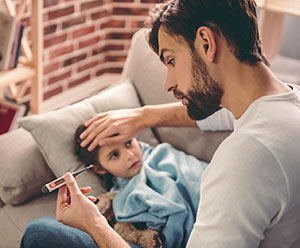What to know
- Signs and symptoms of HPIVs are similar to the common cold.
- Washing hands, avoiding touching your face, and avoiding close contact with people who are sick can help prevent infection.
- Most people with HPIVs will recover on their own.
More Information

Signs and symptoms
HPIVs commonly cause upper and lower respiratory illnesses in infants, young children, older adults, and people with weakened immune systems, but anyone can get infected. Symptoms generally appear 2 to 6 days after infection.
Signs and symptoms are similar to the common cold and can include:
- fever
- runny nose
- cough
- sneezing
- sore throat
Other symptoms of HPIV illness may include:
- ear pain
- irritability
- decreased appetite
HPIVs can also cause more serious illness in children, including:
- croup (infection of the vocal cords [larynx], windpipe [trachea], and sometimes into the bronchial tubes [bronchi])
- bronchitis (infection of the main air passages that connect the windpipe to the lungs)
- bronchiolitis (infection in the smallest air passages in the lungs)
- pneumonia (an infection of the lungs)
Symptoms of more serious illness may include:
- barking cough
- hoarseness
- stridor (noisy or high-pitched sound with breathing)
- wheezing
In adults, upper respiratory infections and bronchitis are the most common illnesses caused by HPIVs; signs and symptoms may include fever, runny nose, cough, and sore throat. Pneumonia may occur, especially in older adults and people with weakened immune systems.
You can have multiple HPIV illnesses in your lifetime.
When to seek emergency care
Prevention
Currently, there is no vaccine to protect you against infection caused by HPIVs. However, researchers are trying to develop vaccines.
You may be able to reduce your risk of HPIV and other respiratory viral infections by taking everyday actions to help stop the spread of germs, like:
- washing your hands often with soap and water for at least 20 seconds. If soap and water are not available, use an alcohol-based hand rub.
- avoiding touching your eyes, nose, or mouth
- avoiding close contact with people who are sick
Frequent hand washing is especially important in childcare settings.
Breastfeeding may protect babies from HPIVs during their first few months of life. That's because mothers may have antibodies (protective proteins) in their breast milk to fight infection.
If you are sick with a common cold illness or cough that may be caused by HPIV, you can help protect others by:
- staying home while you are sick
- avoiding close contact with others
- covering your mouth and nose when you cough or sneeze
- keeping objects and surfaces clean and disinfected
- You may also consider wearing a well-fitted mask. Children ages 2 years and older can wear masks or respirators to protect themselves and others from HPIVs.
Treatment
There is no specific antiviral treatment for HPIV illness. Most people with HPIV illness will recover on their own. However, to relieve symptoms, you can:
- take acetaminophen, ibuprofen, and other over-the-counter medications for pain and fever (Caution: Aspirin should not be given to children.)
- use a room humidifier or take a hot shower to help ease a sore throat and cough
People who are sick should:
- drink plenty of liquids
- stay home and rest
Antibiotics are not effective against HPIVs. Antibiotics are only effective against bacteria. For information about safe antibiotic use, see CDC's Antibiotic Prescribing and Use.
If you are concerned about you or your child's symptoms, you should contact your healthcare provider.
